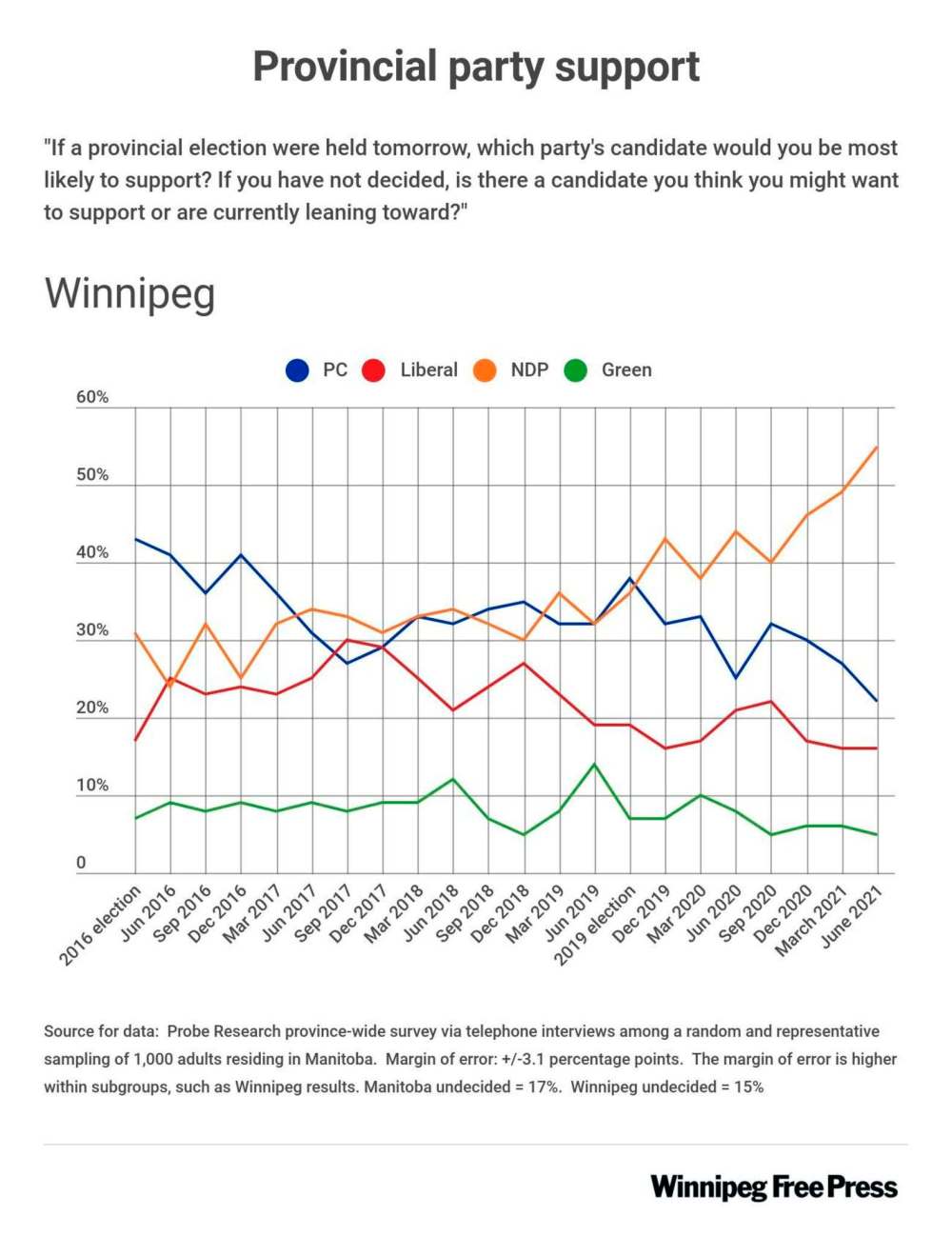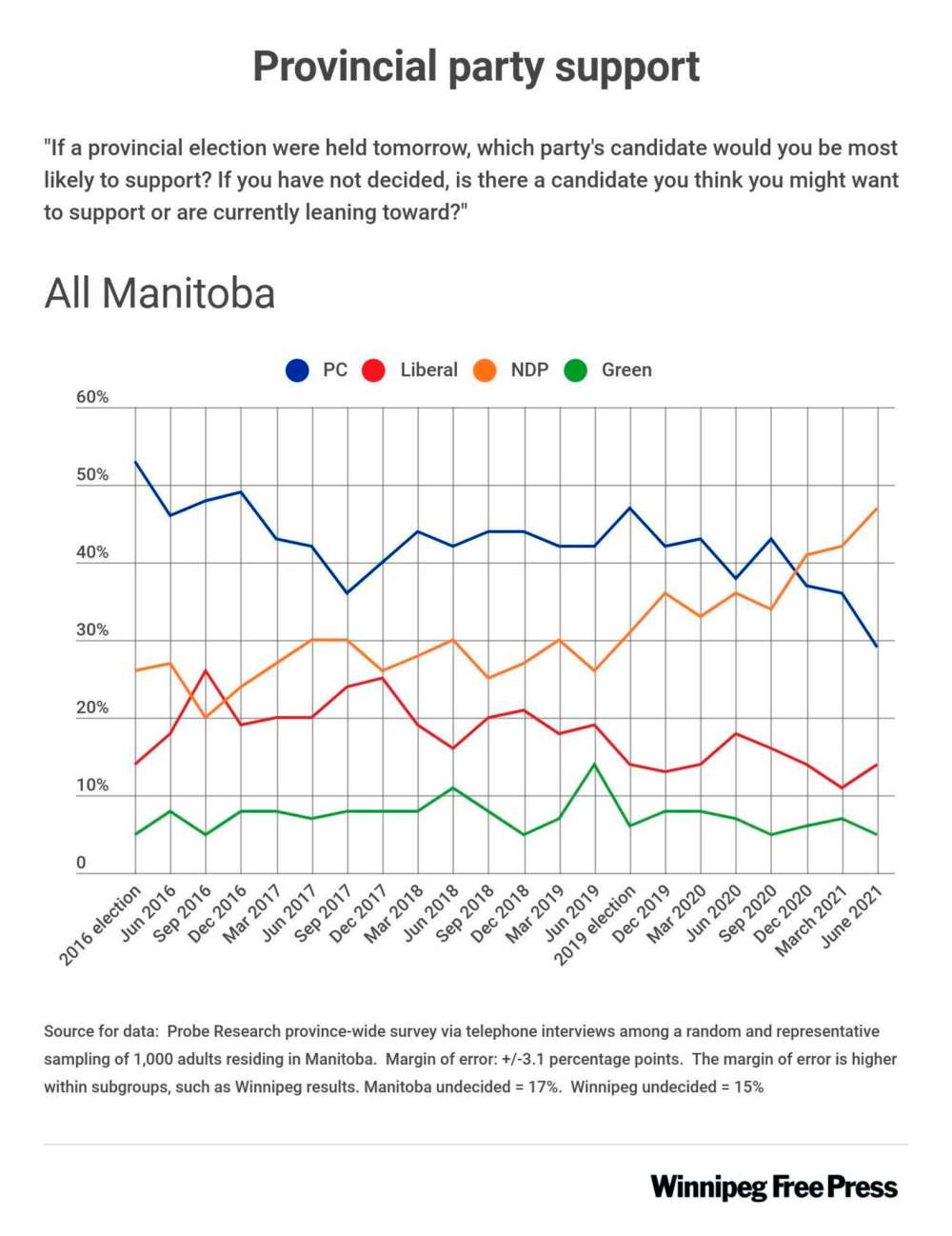Support for Pallister government in tailspin: poll
Read this article for free:
or
Already have an account? Log in here »
To continue reading, please subscribe:
Monthly Digital Subscription
$0 for the first 4 weeks*
- Enjoy unlimited reading on winnipegfreepress.com
- Read the E-Edition, our digital replica newspaper
- Access News Break, our award-winning app
- Play interactive puzzles
*No charge for 4 weeks then price increases to the regular rate of $19.00 plus GST every four weeks. Offer available to new and qualified returning subscribers only. Cancel any time.
Monthly Digital Subscription
$4.75/week*
- Enjoy unlimited reading on winnipegfreepress.com
- Read the E-Edition, our digital replica newspaper
- Access News Break, our award-winning app
- Play interactive puzzles
*Billed as $19 plus GST every four weeks. Cancel any time.
To continue reading, please subscribe:
Add Free Press access to your Brandon Sun subscription for only an additional
$1 for the first 4 weeks*
*Your next subscription payment will increase by $1.00 and you will be charged $16.99 plus GST for four weeks. After four weeks, your payment will increase to $23.99 plus GST every four weeks.
Read unlimited articles for free today:
or
Already have an account? Log in here »
Hey there, time traveller!
This article was published 17/06/2021 (1636 days ago), so information in it may no longer be current.
Premier Brian Pallister’s government would be facing a “catastrophic” reckoning at the ballot box if an election was held tomorrow.
A new Free Press / Probe Research poll indicates support for the province’s governing party is plummeting, as the Tories now trail the NDP by nearly 20 percentage points.
The parties have been on opposite trajectories during the last two years; when the PCs won a second majority government in September 2019, they were at 47 per cent support and the New Democrats were at 31 per cent. Today, the NDP has a commanding lead at 47 per cent of decided voters; the PCs are at 29 per cent.
The gap is even wider in voter-rich Winnipeg, where leader Wab Kinew’s NDP has 55 per cent support, compared to the Tories’ 22 per cent.
“To see, provincewide, the NDP at 47 per cent and PCs at 29 per cent, these could be considered catastrophic numbers for a governing party,” said Christopher Adams, adjunct professor of political studies at the University of Manitoba.
With the city and surrounding area home to the majority of the population — and 32 of the legislature’s 57 seats — the NDP would have a majority if an election were held now.
Pallister’s PCs have dropped from 32 per cent support in Winnipeg in September, to 30 per cent in December, to 27 per cent in March to 22 per cent in June.
While the Tories have enjoyed pockets of support in some well-to-do areas such as Tuxedo, they’re in trouble across most of the city.
“The PCs would be shut out in Winnipeg,” said Adams.
The next provincial election has to occur by Oct. 3, 2023.
The notion that support for the government will soar once the pandemic lifts and the economy recovers is looking less likely, said Probe Research president Scott MacKay.
“We’ve got a long time before the next election, so this isn’t yet over, but the more I start seeing these kind of numbers, the more I wonder how much of a comeback would you really need to get out of this mess?” he said Thursday.
“It’s really looking bad.”
The government’s director of media relations and issues management declined to comment on the survey results.
“Our government’s present focus is on Manitoba’s pandemic response and recovery,” Blake Robert wrote in an email.
Kinew said the only poll that matters is election day, but offered a theory for the survey results putting his party ahead by a wide margin.
“I think it reflects how Manitobans are frustrated with the pandemic, but then there are other issues, too, like the nurses’ strike and Bill 64 (the Education Modernization Act) and hydro rates going up,” he said Thursday.
“There’s been so many areas where the government under the PCs has lost touch with what the average person out there is thinking and what they want.”
The Tories aren’t offering what most women in Manitoba want, the survey shows.
Just 21 per cent of women provincewide — and only 13 per cent in Winnipeg — would vote PC right now. The New Democrats have the support of 55 per cent of women provincewide and 64 per cent in Winnipeg.
“You’re not going to win an election unless you get a strong proportion of women in the electorate supporting you,” said Adams, pointing to past results here and in Saskatchewan.
“When the NDP loses the support of women, they don’t win. We’re seeing the opposite — not only are the NDP gaining back ground, they’re overwhelmingly winning ground from women voters.”
Health care is a major concern with women, who are watching as government austerity measures result in intensive-care patient transfers to other provinces and overwhelmed nurses voting to strike, MacKay said.
“They might have believed in the early days — when there was no pandemic — that these changes might be worth it and there may be some fat in the system,” he said. “But I think now no one’s really believing this.”
The methodology
The Probe Research Inc. survey of a random and representative sampling of 1,000 adults in Manitoba was conducted from June 2 to 11. The survey results are plus or minus 3.1 percentage points of what they would’ve been if the entire adult population had been surveyed with 95 per cent certainty.
Poll question: If a provincial election were held tomorrow, which party’s candidate would you most likely support? Even though you have not decided whom you would vote for, is there nonetheless a provincial party’s candidate that you think you might want to support or are currently leaning toward?
Source: Probe Research Inc.
Even in the Tories’ traditional rural stronghold, their support is slipping. Just 40 per cent of voters said they’d likely vote PC, down from 50 per cent in March. In June, 35 per cent of rural voters expressed support for the NDP, up from 32 per cent in March.
MacKay said he wonders why there’s been silence from the PC caucus about their sinking numbers.
“Often when a party is under this much pressure, there’s something that happens inside the party, and there’s some kind of revolt as there was with (former NDP premier Greg) Selinger,” he said. “Somebody comes onto the scene and starts to sort of make noise or the caucus starts to make noise, and we haven’t really seen this yet.”
MacKay suggested the quiet could hurt some MLAs’ chances re-election, including some who suddenly find themselves vulnerable in city ridings.
“There will be guilt by association,” he said.
“I just wonder how long you can hold on for, with this kind of thing, before somebody has to step up and say, ‘You know, the emperor has no clothes. We have to move on.'”
carol.sanders@freepress.mb.ca

Our newsroom depends on a growing audience of readers to power our journalism. If you are not a paid reader, please consider becoming a subscriber.
Our newsroom depends on its audience of readers to power our journalism. Thank you for your support.
History
Updated on Thursday, June 17, 2021 7:16 PM CDT: changes 20 per cent in lead graph to 20 percentage points.
Updated on Thursday, June 17, 2021 10:33 PM CDT: fixes double comma












